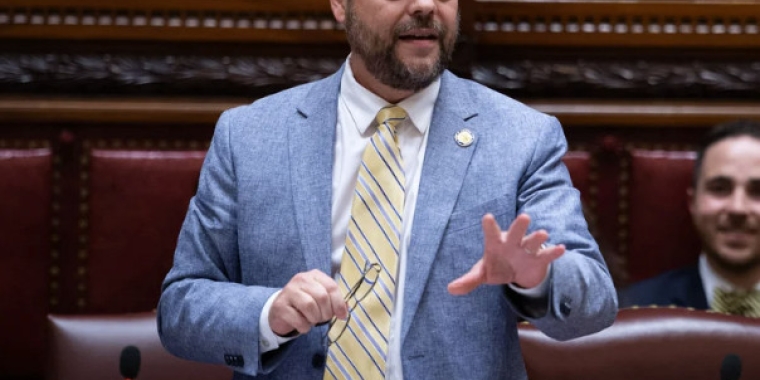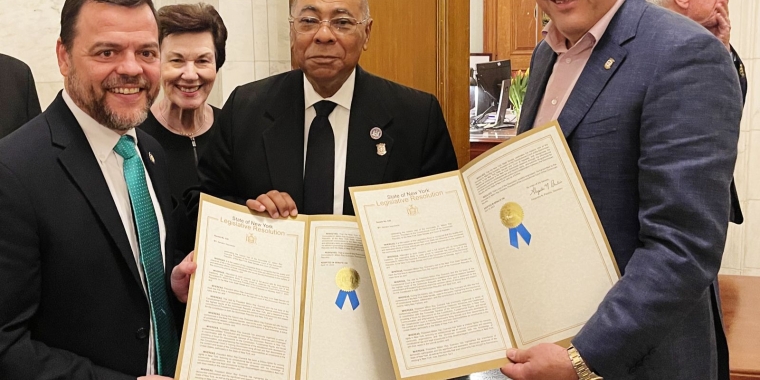
Judicial Advocates Push Lawmakers for Removal of Death Benefits 'Gamble' Anomaly in Retirement Law

Both the New York County Lawyers Association and the Associations of Justices of the Supreme Court of the State of New York have expressed support for the measure.
A key New York judges association and a city bar group are pushing lawmakers to make room in the state budget for a policy bill that would enable state-paid judges to receive death benefits, even if they aren’t retired at the time of their passing.
A New York City attorney, state Sen. Luis Sepúlveda, D-Bronx, is sponsoring the starkly named “Death Gamble” bill, S7567A/A9143, which refers to the “gamble” judges take when they continue to serve while eligible for retirement, by way of an anomaly in law.
Under Section 60 of the Retirement and Social Security Law, the beneficiaries of a judge who is eligible to retire but elects to remain in office and dies while serving receive a substantially more modest benefit than they would have received if the judge retired before passing, say backers of the bill, which is also sponsored by Assemblymember Yudelka Tapia, D-Bronx, an ex-auditor for New York City.
Both the New York County Lawyers Association and the Associations of Justices of the Supreme Court of the State of New York have expressed support for the measure.
“This bill is a common sense advancement of a protection extended to police officers, firefighters and teachers to include judges, many of whom come to the bench later in life as a commitment to public service,” Manhattan Supreme Court Justice Verna Saunders, president of association, said in a statement. “We appreciate Sen. Sepulveda’s and Assemblymember Tapia’s work on this bill, as well as the NYCLA’s statement in support of it, and urge the Legislature to pass it.”
NYCLA has long favored legislative relief for the judges. In 2015, its Board of Directors adopted a resolution urging amendments to the law.
“As we pointed out in our 2015 report (which garnered the support of numerous other bar associations throughout the State and was ultimately adopted by the New York State Bar Association), the impact of the Death Gamble is particularly acute for judges, many of whom rise to that calling later in life,” the organization said.
“As well, it may undermine the incentive for judges eligible for certification to remain on the bench, even as the system continues to have a dire need for their continued service (a need that NYCLA’s Supreme Court Committee and Appellate Courts Committee underscored in a 2020 joint statement).”
Lawmakers, through legislation in 2000, lifted the anomaly in the law as applied to police officers, firefighters, and teachers, when it gave beneficiaries of those state employees the ability to elect to receive either a monthly allowance or lump sum equal to the amount the decedent would have been entitled to receive if he or she had retired the day before his or her death.
NYCLA said it also wants lawmakers “to consider going even further” than the bill calls for by giving judges the same benefits that the 2000 legislation gave to police officers, firefighters, and teachers.
Rusking Pimentel, Sepúlveda’s spokesman, said the senator appreciates the advocacy for his bill, which said is a “recognition of the importance of fair treatment for our judiciary underscores the significance of the proposed legislative reforms.”
Sepúlveda, according to his spokesman, said the bill is among those he is prioritizing for inclusion in the 2025 state budget, a process that has been extended beyond the March 31 deadline, as lawmakers continue to negotiate reforms for a statewide housing crisis, crackdown on illicit cannabis stores, and other policy matters.
“The Senator believes that enacting these reforms is essential to upholding the integrity and independence of our judiciary, which are foundational to the rule of law in our state,” Pimentel said
In terms of fiscal impacts, bill sponsors project there will be an increase of approximately $243,000 in the annual contributions of New York for the present fiscal year ending March 2025.
They said costs will vary in future years as billing rates and salaries change.
There will also be an immediate past service cost in excess of $3.8 million, which will be borne by the state as a one-time payment, the sponsors said.
If New York elects to amortize the cost over 10 years, the cost for each year, including interest, would be $493,000, they project.
The sponsors made those estimates based on 1,148 affected judges with combined annual salaries of approximately $222 million.
